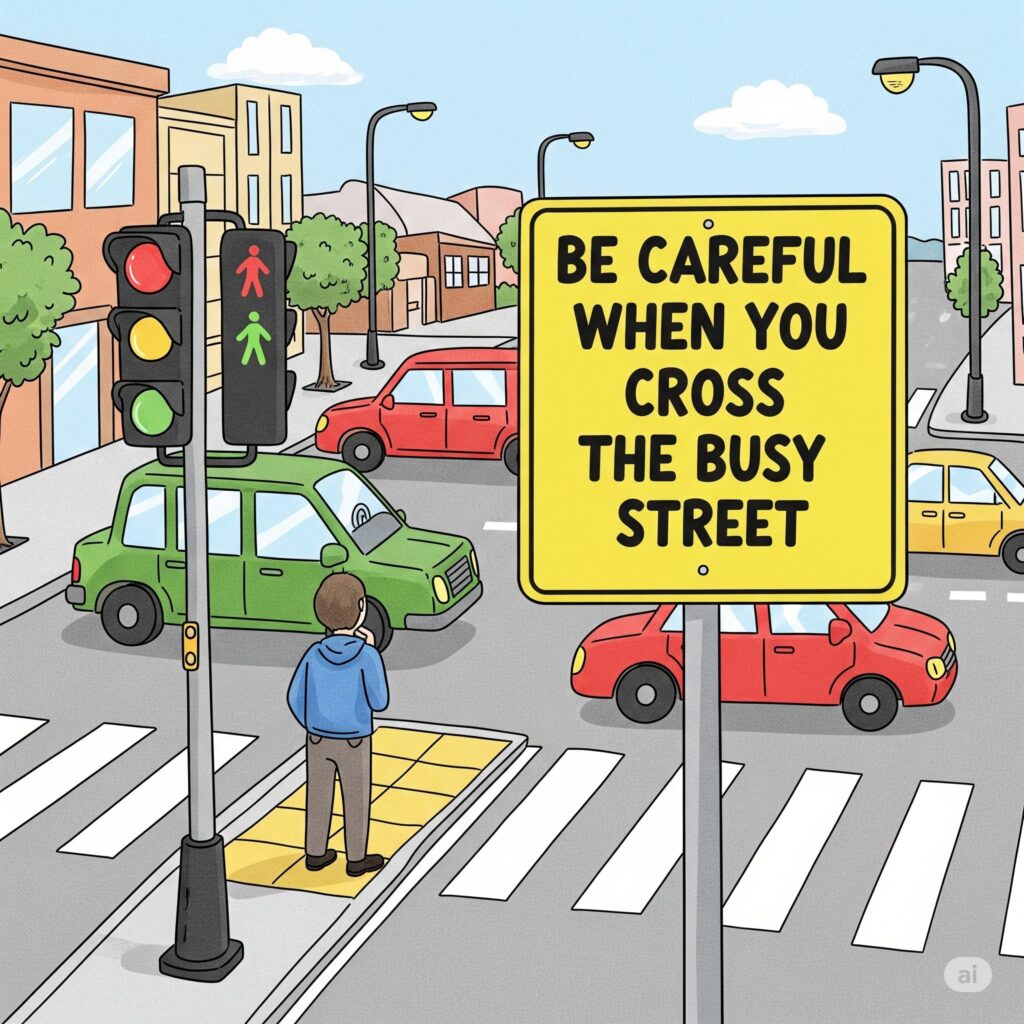crossの基本について知ろう
今回は「cross」について詳しくご説明します。「cross」は非常に多義的な単語で、動詞、名詞、形容詞、さらには前置詞としても使われます。それぞれの品詞での主な意味と使い方を見ていきましょう。
「cross」の主な意味と使い方
1. 動詞 (Verb)
- 横切る、渡る (to go from one side to the other of something): 最も一般的な意味で、道や川、国境などを越える動作です。
- 例文:
- Be careful when you cross the street. (通りを渡る時は注意してください。)
- The bridge crosses the river. (その橋は川を渡っている。)
- We crossed the border into Canada. (私たちは国境を越えてカナダに入った。)
- 例文:
- 交差する、交わる (to meet and pass): 線や道などが一点で交わる状態を表します。
- 例文:
- The two roads cross here. (この場所で2つの道が交差している。)
- Our paths crossed again after many years. (何年かぶりに私たちの道が再び交わった。)
- 例文:
- (腕などを)組む、交差させる (to put one thing over another): 腕や足を組む動作です。
- 例文:
- He crossed his arms over his chest. (彼は胸の前で腕を組んだ。)
- Don’t cross your legs during the interview. (面接中は足を組まないでください。)
- 例文:
- (計画などを)妨げる、邪魔をする (to oppose someone’s plans or wishes): 誰かの意図や計画に反対したり、邪魔をしたりする。
- 例文:
- Don’t try to cross me. (私の邪魔をしようとしないでください。)
- You don’t want to cross him when he’s angry. (彼が怒っている時に逆らおうとしない方がいい。)
- 例文:
- (スポーツで)クロスを上げる (to kick or hit a ball across the field): サッカーなどで、サイドからゴール前にボールを送る動作です。
- 例文:
- He crossed the ball into the penalty area. (彼はボールをペナルティエリアにクロスした。)
- 例文:
2. 名詞 (Noun)
- 十字、十字架 (a mark or object in the shape of a cross): 十字の形やキリスト教の十字架を指します。
- 例文:
- He made a cross on the map. (彼は地図に十字の印をつけた。)
- She wore a silver cross around her neck. (彼女は首に銀の十字架をつけていた。)
- 例文:
- 交差点 (a place where roads or lines cross): 道が交わる場所を指します。
- 例文:
- Turn left at the next cross. (次の交差点を左に曲がってください。) (口語的、junction, intersectionがより一般的)
- 例文:
- (スポーツの)クロス (a ball that is kicked or hit across the field): サッカーなどで、サイドからゴール前に送られたボール。
- 例文:
- It was a perfect cross, but the striker missed it. (完璧なクロスだったが、ストライカーはそれを外した。)
- 例文:
- 混合種、雑種 (a mixture of two different things): 異なる品種や種類を掛け合わせたもの。
- 例文:
- The dog is a cross between a poodle and a terrier. (その犬はプードルとテリアの雑種だ。)
- 例文:
3. 形容詞 (Adjective)
- 怒って、不機嫌で (angry or annoyed): 口語的な表現で、気分が悪かったり、怒っていたりする状態。
- 例文:
- Don’t be cross with me! (私に怒らないで!)
- She gets cross when things don’t go her way. (物事が思い通りにいかないと彼女は不機嫌になる。)
- 例文:
- 交差した、斜めの (going from one side to the other, or intersecting): 物理的に交差している状態。
- 例文:
- Cross wires can cause problems. (交差した配線は問題を引き起こす可能性がある。)
- 例文:
4. 前置詞 (Preposition)
- ~を横切って、~を渡って (across):
acrossとほぼ同じ意味で使われますが、やや古風な響きがあるか、特定のフレーズで使われます。- 例文:
- He walked cross the field. (彼は野原を横切って歩いた。) (現在では “across the field” が一般的)
- 例文:
「cross」を含む主な句動詞(Phrasal Verbs)とイディオム
- cross out: (間違いなどを)消す、線を引いて消す
- 例文: Please cross out the incorrect answers.
- cross off: (リストから)消す、削除する
- 例文: I crossed off three items from my to-do list.
- cross over: 渡る、移行する、境界を超える
- 例文: The band’s music crossed over from country to pop.
- cross one’s mind: (考えが)ふと頭をよぎる
- 例文: It never crossed my mind that he would betray me.
- cross one’s fingers: 幸運を祈る(指をクロスさせるジェスチャーから)
- 例文: I’m crossing my fingers for your exam.
- cross the line: (許容範囲を)逸脱する、一線を越える
- 例文: Your behavior has crossed the line.
- cross paths (with someone): (人と)偶然出会う、鉢合わせる
- 例文: I crossed paths with an old friend at the supermarket.
- cross-examine: 反対尋問する(法廷などで)
- 例文: The lawyer began to cross-examine the witness.
「cross」は、その形(十字)から派生した意味や、物理的な移動、そして比喩的な「邪魔をする」「怒る」といった感情まで、非常に幅広い意味を持つ言葉です。文脈をしっかり理解することが重要です。
crossの類似表現について知ろう
「cross」の類似表現について、その多義的な意味合いに合わせて詳しく見ていきましょう。「cross」は「横切る」「交差する」「怒る」「十字」など、非常に多くの意味を持つため、類似表現も文脈によって大きく異なります。

「cross」の類似表現
1. 「横切る」「渡る」(動詞)
- go across:
- 最も一般的で、
crossとほとんど同じ意味で使えます。goとacrossの組み合わせで、場所を横断する動作を表します。 - 例文: He went across the street. (彼は通りを渡った。)
- 例文: We went across the field to the woods. (私たちは野原を横切って森へ向かった。)
- 最も一般的で、
- pass over / pass through:
pass overは「~の上を通過する」「~を乗り越える」というニュアンス。橋を渡る、山を越えるなど。pass throughは「~の中を通り抜ける」というニュアンス。町を通り抜ける、トンネルを通過する、経験を通り抜けるなど。- 例文: The train passed over the bridge. (列車は橋を通過した。)
- 例文: We passed through a small village. (私たちは小さな村を通り抜けた。)
- traverse:
- 「横断する」「通過する」という意味で、よりフォーマルな響きがあります。特に広範囲や困難な地形(砂漠、山脈など)を横切る場合に使われます。骨の折れる旅や移動を示唆します。
- 例文: The explorers traversed the desert. (探検家たちは砂漠を横断した。)
- 例文: It took us three days to traverse the entire national park. (国立公園全体を横断するのに3日かかった。)
- ford:
- 「(浅瀬を)徒歩で渡る」「徒渉する」という意味で、特に足で歩いて川などの浅い部分を渡る場合に限定されます。
- 例文: They forded the stream. (彼らは小川を徒歩で渡った。)
2. 「交差する」「交わる」(動詞)
- intersect:
- 「交差する」「交わる」という最も直接的な、幾何学的・学術的な表現。特に線、道路、通路などが一点で交わることを指します。
- 例文: The two lines intersect at point A. (2つの線はA点で交差する。)
- 例文: Where do these two roads intersect? (この2つの道はどこで交差しますか?)
- converge:
- 「一点に集まる」「収束する」「合流する」という意味。道や思想などが最終的に同じ地点や結論で合流するニュアンスです。
- 例文: The two roads converge just outside the town. (その2つの道は町のすぐ外で合流する。)
- 例文: Different opinions began to converge on a single solution. (異なる意見が単一の解決策に収束し始めた。)
- meet:
- 「出会う」「合流する」という一般的な表現。道や川などが交わる際にも使われます。
- 例文: The two rivers meet near the city. (その2つの川は市の近くで合流する。)
3. 「怒っている」「不機嫌な」(形容詞)
- angry:
- 最も一般的な「怒っている」という意味。
crossよりも強い怒りを表すことが多いです。 - 例文: She was angry about the decision. (彼女はその決定に怒っていた。)
- 最も一般的な「怒っている」という意味。
- annoyed:
- 「いらいらしている」「迷惑している」という、
crossよりも軽い怒りや不快感を表します。何かにうんざりしている状態。 - 例文: He was annoyed by the constant noise. (彼は絶え間ない騒音にいらいらしていた。)
- 「いらいらしている」「迷惑している」という、
- upset:
- 「動揺している」「気分が悪い」という意味で、怒りだけでなく、悲しみや不満、落胆などを含む幅広い感情を表します。感情的に混乱している状態。
- 例文: She was upset that her plans were cancelled. (彼女は計画がキャンセルされて動揺していた。)
- irritable:
- 「怒りっぽい」「いらいらしやすい」という、性格や一時的な状態を表します。普段から不機嫌になりやすい性質。
- 例文: He gets very irritable when he’s tired. (彼は疲れているととても怒りっぽくなる。)
- grumpy:
- 「不機嫌な」「むっつりした」という、よりカジュアルで、慢性的な不機嫌さを表すことが多いです。
- 例文: The old man is always grumpy in the mornings. (その老人はいつも朝は不機嫌だ。)
4. 「妨げる」「邪魔をする」「逆らう」(動詞)
- oppose:
- 「反対する」「対立する」という意味。
crossが「逆らう」ニュアンスであるのに対し、より広範な反対を表します。意見や計画に反対する。 - 例文: Many people opposed the new policy. (多くの人々が新しい政策に反対した。)
- 「反対する」「対立する」という意味。
- thwart:
- 「(計画などを)阻止する」「くじく」という意味で、誰かの試みや計画を成功させないようにする。
- 例文: The police thwarted the bank robbery. (警察は銀行強盗を阻止した。)
- hinder:
- 「妨げる」「邪魔する」という意味で、進行や発展を遅らせたり、困難にしたりする。
- 例文: Lack of funds hindered the project’s progress. (資金不足がプロジェクトの進行を妨げた。)
- obstruct:
- 「妨害する」「遮る」という意味で、物理的に通路を遮ったり、進行を妨げたりする。
- 例文: A fallen tree obstructed the road. (倒木が道路を遮っていた。)
「cross」は非常に多岐にわたる意味を持つため、類似表現を選ぶ際には、その文脈で「cross」がどのような意味合いで使われているかを正確に把握することが最も重要です。
crossのイディオムを知ろう
「cross」を使ったイディオム(idiom:慣用句)は非常に多く、日常会話で頻繁に登場します。主なものを意味と例文とともにご紹介します。

「cross」のイディオム
- cross one’s mind: (考えが)ふと頭をよぎる、思い浮かぶ
- 意味: 突然、ある考えやアイデアが頭に浮かぶこと。
- 例文: It never crossed my mind that he would betray me. (彼が私を裏切るなんて、全く考えもしなかった。)
- 例文: A strange idea just crossed my mind. (奇妙な考えがふと頭をよぎった。)
- cross one’s fingers: 幸運を祈る、成功を願う
- 意味: 人差し指と中指を交差させるジェスチャーと共に行う、誰かの成功や幸運を願う表現。
- 例文: I’m crossing my fingers for your exam tomorrow! (明日の試験、うまくいくように祈ってるよ!)
- 例文: Let’s cross our fingers that the weather holds up. (天気がもってくれるように祈ろう。)
- cross the line: (許容範囲を)逸脱する、一線を越える
- 意味: 許される行動や発言の範囲を超えて、不適切または不快な行為をすること。
- 例文: Your rude comments have crossed the line. (あなたの失礼なコメントは度を超えている。)
- 例文: He knew he was crossing the line with that joke. (彼はあの冗談で一線を越えていると分かっていた。)
- cross paths (with someone): (人と)偶然出会う、鉢合わせる
- 意味: 偶然に誰かと出会うこと。物理的な道だけでなく、人生の道という意味でも使われます。
- 例文: I crossed paths with an old friend at the supermarket yesterday. (昨日スーパーで旧友に偶然会った。)
- 例文: I hope our paths cross again soon. (また近いうちに会えることを願っているよ。)
- cross one’s heart (and hope to die): (誓って)本当に、嘘偽りなく
- 意味: 自分の言っていることが真実であると強く誓う、または約束を破らないと誓う際に使われる、やや古風または子供っぽい表現。
- 例文: I didn’t tell anyone, cross my heart. (誰にも言っていないよ、誓って本当だよ。)
- cross someone’s palm with silver: (人)に金銭を渡して予言させる、賄賂を渡す
- 意味: 特に手相占い師などにお金を渡して占ってもらう、または比喩的に賄賂を渡すことを意味します。
- 例文: The fortune teller asked me to cross her palm with silver before she started. (手相占い師は始める前に私に銀貨を渡すよう求めた。)
- cross the bridge when one comes to it: その時になったら考える、橋にたどり着いてから渡る
- 意味: 先のことは、その問題に直面した時に考えればよいという意味。不必要な心配をしないことを示唆します。
- 例文: I know we have a big decision ahead, but let’s cross that bridge when we come to it. (大きな決断が控えているのはわかるけど、その時になったら考えよう。)
- cross swords (with someone): (人と)論争する、対立する
- 意味: (剣で戦うように)誰かと激しく議論したり、意見が対立したりすること。
- 例文: He often crosses swords with his colleagues over policy issues. (彼はよく政策問題で同僚と激しく議論する。)
- cross out: (間違いなどを)消す、線を引いて消す
- 意味: 文字や図の上に線を引いて、それが不要または間違っていることを示すこと。
- 例文: Please cross out any incorrect answers on the form. (用紙の誤った回答には線を引いて消してください。)
- cross off: (リストなどから)消す、削除する
- 意味: リストにある項目が完了した、または不要になったため、それを削除すること。
- 例文: I crossed off three items from my to-do list today. (今日、やることリストから3つの項目を消した。)
「cross」は、物理的な「交差」や「横切る」という動作から派生して、非常に多くの比喩的な意味を持つイディオムを形成しています。これらの表現を使いこなすことで、より自然で豊かな英語表現が可能になります。
crossのコロケーションを確認しよう
「cross」のコロケーション(collocation)について、つまり「cross」とよく一緒に使われる単語やフレーズを、その主な意味合いに分けて確認していきましょう。

「cross」のコロケーション
「cross」は、物理的な横断や交差、比喩的な行動、感情、そして名詞としての「十字」や「交差点」など、非常に多様な意味で使われます。
1. 動詞としての「cross」
- 横切る、渡る (to go from one side to the other of something):
- cross a street/road/river/bridge: 通り/道/川/橋を渡る
- 例文: Be careful when you cross the street. (通りを渡るときは注意してください。)
- cross the border/line: 国境/境界線を越える
- 例文: We crossed the border into Mexico. (私たちは国境を越えてメキシコに入った。)
- cross the finish line: ゴールラインを越える
- 例文: She was the first to cross the finish line. (彼女は最初にゴールラインを越えた。)
- cross a desert/mountain: 砂漠/山脈を横断する
- 例文: It took days to cross the desert. (砂漠を横断するのに何日もかかった。)
- cross a street/road/river/bridge: 通り/道/川/橋を渡る
- 交差する、交わる (to meet and pass):
- cross paths/roads: 道が交差する、出会う
- 例文: Our paths crossed again after many years. (何年かぶりに私たちの道が再び交わった。)
- cross over: 交差して越える、移行する
- 例文: The two wires cross over each other. (2本のワイヤーが互いに交差している。)
- cross paths/roads: 道が交差する、出会う
- (腕などを)組む、交差させる (to put one thing over another):
- cross one’s arms/legs: 腕/足を組む
- 例文: He crossed his arms over his chest. (彼は胸の前で腕を組んだ。)
- cross one’s fingers: 指を組む(幸運を祈るジェスチャー)
- 例文: I’m crossing my fingers for you. (君のために幸運を祈っているよ。)
- cross one’s arms/legs: 腕/足を組む
- (計画などを)妨げる、邪魔をする (to oppose someone’s plans or wishes):
- cross someone (e.g., a boss/opponent): (人)に逆らう、邪魔をする
- 例文: You don’t want to cross him when he’s in a bad mood. (彼が不機嫌なときに彼に逆らわない方がいい。)
- cross someone (e.g., a boss/opponent): (人)に逆らう、邪魔をする
- (スポーツで)クロスを上げる (to kick or hit a ball across the field):
- cross the ball: ボールをクロスする(サッカーなどで)
- 例文: He crossed the ball into the penalty area. (彼はボールをペナルティエリアにクロスした。)
- cross the ball: ボールをクロスする(サッカーなどで)
- 線を引いて消す (to mark out):
- cross out (a word/name/error): (単語/名前/間違い)を線で消す
- 例文: Please cross out any incorrect information. (誤った情報には線を引いて消してください。)
- cross off (a list/item): (リストの項目)を消す、削除する
- 例文: I crossed off two items from my to-do list. (やることリストから2つの項目を消した。)
- cross out (a word/name/error): (単語/名前/間違い)を線で消す
2. 形容詞としての「cross」
- 怒って、不機嫌で (angry or annoyed):
- get/be cross (with someone): (人)に怒る、不機嫌になる
- 例文: Don’t be cross with me! I didn’t mean to upset you. (私に怒らないで!あなたを怒らせるつもりはなかったのよ。)
- 例文: She gets cross when she’s tired. (彼女は疲れると不機嫌になる。)
- get/be cross (with someone): (人)に怒る、不機嫌になる
3. 名詞としての「cross」
- a cross (e.g., Christian Cross): 十字架
- wear a cross: 十字架を身につける
- 例文: She wears a small silver cross around her neck. (彼女は首に小さな銀の十字架をつけている。)
- wear a cross: 十字架を身につける
- a cross between A and B: AとBの間の雑種/混合
- 例文: The animal looks like a cross between a fox and a dog. (その動物はキツネと犬の雑種のように見える。)
- a cross to bear: 負わなければならない重荷、苦難
- 例文: His illness was a heavy cross to bear. (彼の病気は重い苦難だった。)
- at the crossroads: 岐路に立って、重要な決断を迫られている
- 例文: We are at a crossroads in our lives. (私たちは人生の岐路に立っている。)
これらのコロケーションは、「cross」を使う際に非常に役立ちます。どのような目的語や前置詞と結びつくか、またどのような文脈で使われるかを意識すると、より自然で正確な英語表現が可能になります。
crossに関連する練習問題に挑戦しよう
「cross」に関する英文和訳と和文英訳の練習問題を10問ずつ作成しました。動詞、名詞、形容詞としての使用、そして句動詞やイディオム、コロケーションを幅広く含むように配慮しましたので、ぜひ挑戦してみてください。

【英文和訳】以下の英文を日本語に訳してください。(10問)
- Be careful when you cross the busy street.
- It never crossed my mind that he would leave.
- She crossed her arms and stared at him.
- The two roads cross just outside the town.
- I’m crossing my fingers for your job interview tomorrow.
- Don’t be cross with me; it wasn’t my fault.
- His rude remarks really crossed the line.
- I need to cross off a few items from my to-do list.
- He successfully crossed the desert in five days.
- The company is at a crossroads regarding its future strategy.
【和文英訳】以下の日本語を英文に訳してください。(10問)
- 道を渡る前に左右を確認しなさい。
- その考えは私の頭をよぎったことがなかった。
- 彼は胸の前で腕を組んだ。
- 彼女はミスを線で消した。
- 私たちは偶然、古い友人と出会った。
- 彼は私に怒っていた。
- あなたの行動は一線を越えている。
- リストから彼の名前を消す必要がある。
- この犬はラブラドールとゴールデンレトリバーの雑種だ。
- その川を渡るには、橋を渡るしかない。
解答
【英文和訳】
- 交通量の多い通りを渡る際は注意してください。
- 彼が去るなんて、全く思いもしなかった。
- 彼女は腕を組み、彼をじっと見つめた。
- その2つの道は町のすぐ外で交差している。
- 明日の就職面接、うまくいくように祈っているよ。
- 私に怒らないでください。私のせいではありませんでした。
- 彼の失礼な発言は本当に度を越していた。
- やることリストからいくつか項目を消す必要がある。
- 彼は5日で砂漠を横断することに成功した。
- その会社は将来の戦略に関して岐路に立っている。
【和文英訳】
- Look both ways before you cross the road.
- That idea never crossed my mind.
- He crossed his arms in front of his chest.
- She crossed out the mistake.
- We crossed paths with an old friend.
- He was cross with me.
- Your behavior has crossed the line.
- I need to cross off his name from the list.
- This dog is a cross between a Labrador and a Golden Retriever.
- To cross that river, you have to go over the bridge.
てばっち英語研究所|おすすめ学習ツール
【書籍】
今日の解説で「なるほど!」と思った方には、ぜひ手に取ってほしい一冊があります。
それが、『一億人の英文法』**です。 専門用語の暗記ではなく、「なぜネイティブはこう言うのか?」というイメージを徹底的に解説してくれます。
私はこの本に出会って、英語の景色がガラリと変わりました。 解説を読んで「もっと深く知りたい」と感じたなら、間違いなくあなたのバイブルになります。
【オンライン英会話】
知識として理解できたら、次は『自分の言葉』として使ってみることが上達の近道です。 Camblyなら、予約なしですぐにネイティブ講師と繋がれるので、今日学んだ知識をさっそく会話で試してみませんか?
【コーチング】
文法を理解しても、それを使いこなすための『圧倒的な練習量』を一人でこなすのは至難の業です。 もし、あなたが『今度こそ、絶対に挫折したくない』と本気で思っているなら、ライザップイングリッシュの門を叩いてみてください。専属トレーナーが、あなたの学習を1分単位で管理し、短期間で劇的な変化をもたらします。


![[商品価格に関しましては、リンクが作成された時点と現時点で情報が変更されている場合がございます。] [商品価格に関しましては、リンクが作成された時点と現時点で情報が変更されている場合がございます。]](https://hbb.afl.rakuten.co.jp/hgb/508699a7.eb9372ff.508699a8.27a980f1/?me_id=1213310&item_id=15566187&pc=https%3A%2F%2Fthumbnail.image.rakuten.co.jp%2F%400_mall%2Fbook%2Fcabinet%2F5278%2F9784890855278_1_4.jpg%3F_ex%3D240x240&s=240x240&t=picttext)



